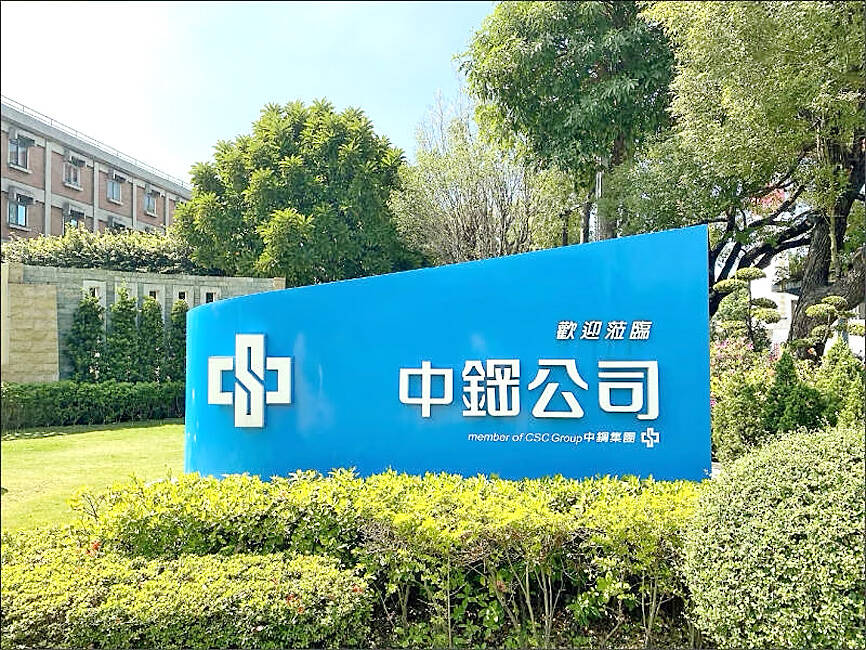China Steel Corp (CSC, 中鋼) yesterday reported that consolidated pretax profit for the first half of this year soared 107.8 percent year-on-year on the back of higher sales volume and unit profit as well as gains from construction.
It was also helped by an increase in nonoperating income, such as higher dividends and interest income from the company’s mining investments, China Steel said in a statement.
Pretax profit was NT$3.498 billion (US$106.42 million) from January to last month, up from NT$1.68 billion during the same period last year, the statement said.

Photo courtesy of China Steel Corp
Cumulative revenue totaled NT$188.33 billion in the first half of this year, up from NT$186.7 billion during the same period last year, with shipments of 3.96 million tonnes, it said.
The company said it is upbeat about the outlook for the second half of this year, given the steady global economic recovery and an anticipated improvement in end-market demand as major central banks cut interest rates.
Taiwan’s export momentum is also heating up, vehicle sales in the domestic market are steady, and demand for factories, offices and residential construction is rising, which would contribute to increased demand for steel related to the auto industry, home appliances and construction, the company said.
A government plan to invest trillions in national development, announced earlier this month by the Cabinet, is also expected to channel funds into domestic strategic industries, as well as urban renewal and social housing projects, boding well for the long-term outlook of steel demand, it added.
Meanwhile, an upward trend in global steel prices amid improving supply-demand dynamics would help boost product prices for shipments in the second half after hitting a trough last quarter, it said.
In a separate statement yesterday, China Steel said it would provide self-adhesive coated electromagnetic steel for electric vehicle (EV) motors to TEMICO Motor India Pvt Ltd, an Indian unit of TECO Electric & Machinery Co (東元電機).
The deal would help TEMICO Motor deliver powertrains to customers in the first quarter of next year, after the firm earlier this month announced that it had obtained powertrain orders from major Indian EV manufacturers.
It would also assist China Steel’s Indian unit in developing high efficiency, self-adhesive electromagnetic steel for EV motors in preparation for localization needs, the company said.

To many, Tatu City on the outskirts of Nairobi looks like a success. The first city entirely built by a private company to be operational in east Africa, with about 25,000 people living and working there, it accounts for about two-thirds of all foreign investment in Kenya. Its low-tax status has attracted more than 100 businesses including Heineken, coffee brand Dormans, and the biggest call-center and cold-chain transport firms in the region. However, to some local politicians, Tatu City has looked more like a target for extortion. A parade of governors have demanded land worth millions of dollars in exchange

An Indonesian animated movie is smashing regional box office records and could be set for wider success as it prepares to open beyond the Southeast Asian archipelago’s silver screens. Jumbo — a film based on the adventures of main character, Don, a large orphaned Indonesian boy facing bullying at school — last month became the highest-grossing Southeast Asian animated film, raking in more than US$8 million. Released at the end of March to coincide with the Eid holidays after the Islamic fasting month of Ramadan, the movie has hit 8 million ticket sales, the third-highest in Indonesian cinema history, Film

Taiwan Semiconductor Manufacturing Co’s (TSMC, 台積電) revenue jumped 48 percent last month, underscoring how electronics firms scrambled to acquire essential components before global tariffs took effect. The main chipmaker for Apple Inc and Nvidia Corp reported monthly sales of NT$349.6 billion (US$11.6 billion). That compares with the average analysts’ estimate for a 38 percent rise in second-quarter revenue. US President Donald Trump’s trade war is prompting economists to retool GDP forecasts worldwide, casting doubt over the outlook for everything from iPhone demand to computing and datacenter construction. However, TSMC — a barometer for global tech spending given its central role in the

Alchip Technologies Ltd (世芯), an application-specific integrated circuit (ASIC) designer specializing in server chips, expects revenue to decline this year due to sagging demand for 5-nanometer artificial intelligence (AI) chips from a North America-based major customer, a company executive said yesterday. That would be the first contraction in revenue for Alchip as it has been enjoying strong revenue growth over the past few years, benefiting from cloud-service providers’ moves to reduce dependence on Nvidia Corp’s expensive AI chips by building their own AI accelerator by outsourcing chip design. The 5-nanometer chip was supposed to be a new growth engine as the lifecycle